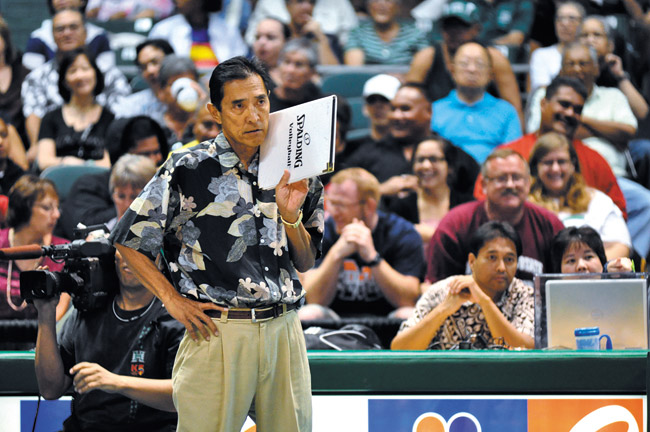Coach Dave Shoji – Baseball Fan

University of Hawaii women’s volleyball head coach Dave Shoji concentrates on the action | Lawrence Tabudlo photo
Before he was the winningest coach in University of Hawaii history and long before he set the record to become the winningest head coach in NCAA women’s volleyball history, Dave Shoji was a baseball fan. Make that a Los Angeles Dodgers fan.
“Die-hard,” Shoji tells me.
During this historic climb by Shoji to the top of his own sport’s victory ladder, he always has a few moments to check on his favorite team’s latest results.
“They’ve had an amazing run this season. Their winning percentage since late June has been unbelievable,” he says.
“(Yasiel) Puig, Hanley Ramirez, (Zack) Greinke – all of them have been incredible during this turnaround.”
Shoji grew up in the town of Upland, Calif., about 30 miles east of Los Angeles, well within the sound of the voice of Dodger Hall of Fame play-by-play announcer Vin Scully. Like so many Southern Californians in the 1960s, Shoji practically slept with his transistor radio in the summer time. “Vin Scully (now 85 and still broadcasting) was a legend even when I was in high school,” the 66-year-old Shoji says.
A shortstop on his high school baseball team good enough to beat out future Major League star Rollie Fingers for his school’s Athlete of the Year award, Shoji and his friends could-n’t wait to see the Dodgers in action.
“After they opened Dodger Stadium (in 1962), we used to go to games about once a week in the summertime,” he recalls.
“I still have some of my old tickets. It was a buck fifty for outfield seats, $2.50 for the (upper level) seats and $3.50 for box seats. We used to buy (upper level) seats and sneak down.”
Shoji’s love of baseball followed him to college at UC-Santa Barbara, but his lack of arm strength eventually pushed him toward volleyball.
“I had a bad arm. I couldn’t make the long throw from deep short,” he says. “I played one year, as a freshman, at UCSB. I played second base.”
As all Hawaii fans know by now, Shoji’s misfortune on the baseball diamond turned out to be gold on the volleyball court. His historic coaching career at UH started in the mid-1970s, and now the only question is when will he retire. Besides winning four national championships and coaching several All-Americans over the past four decades, Shoji mixed in his passion for baseball.
“I coached both of my boys through Little League,” he says. Sons Kawika and Erik, both of whom were championship volleyball players, played for their dad in the Manoa League. “They were good Little League players, even though they didn’t play the game after that. Both were pitchers. Kawika also played shortstop, and Erik played first base and second base. It’s a very competitive league.”
Nowadays, in between the digs and spikes and strategizing for his next volleyball victory, Shoji continues to sneak a peek toward his first love.
“I follow the box scores, especially checking out the local players,” he says, “Shane Victorino, Kolten Wong since he came up, Brandon League, Kurt Suzuki and all the rest. It’s fun.”
You don’t forget your first love, even in the world of sports. As Shoji coaches the Rainbow Wahine to another conference title and a hopeful spot in the NCAA Final Four, he also hopes to be following his beloved Dodgers all the way to the World Series.





